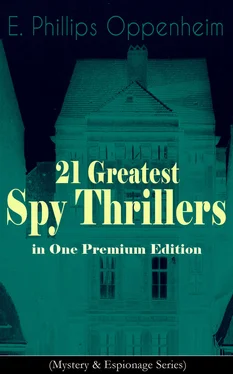“There is also,” Herodin continued, “the very shabby taxicab in which you arrived last night.”
“The chauffeur is to wait,” Charles replied. “It would be a kindness, Mr. Herodin, if you could send him round to the back and supply him with coffee and anything else he wants. He is an old friend, once valet at the Embassy. I picked him up at the station on my arrival and have engaged him for my few days here.”
“It is a very gracious action,” Herodin murmured.
Charles Mildenhall was of an age when nature speedily reasserts itself. He drank his coffee, then he sent down for Fritz, who presently arrived already a different person and dressed in an entirely new suit of clothes.
“Feeling better, Fritz?” his patron enquired.
The chauffeur grinned.
“And the wife, sir,” he replied. “Food and wine, they do make a difference. We drank your health, sir—yes, I can promise you that—more than once, too.”
“Now listen,” Charles said, tapping a cigarette and lighting it. “I have two to three days to spare in this city and I am very anxious to discover the whereabouts of a young lady and a man called Blute who was an agent of Mr. Leopold Benjamin, the banker.”
“Yes, sir.”
“That is going to be our work,” Charles went on, “for every minute of the time until I have to leave for England. I know they will be difficult to find, because they were in a way members of Mr. Benjamin’s household and that has been broken up, but we must set our minds to it.”
“We will find them, sir,” Fritz declared confidently. “The young lady, now,” he went on, “would she be a young lady with red hair?”
“Good God, how did you know that? Of course she has red hair—very beautiful and plenty of it.”
Fritz smiled.
“Rather small in figure—very pleasant voice and a real smile?”
“What do you know about her?” Charles demanded eagerly. “Have you seen her lately?”
Fritz shook his head.
“Well over a year ago, sir,” he admitted, “and it’s a queer thing how I come to remember it, except that she was almost the first fare I had. The young lady you are looking for, she came out of the porter’s lodge of the Palais Franz Josef where she had been talking to the woman there. Why, it could not have been more than a day or a couple of days after you left. I was to drive her to the Benjamin Bank, but when we got within a street of it she stopped me. We could see that there were soldiers guarding the place. She jumped out, paid me and slipped away.”
“Patricia Grey her name was.”
“I never heard any name,” Fritz admitted, “but that young lady came out of the lodge and I drove her to Benjamin’s Bank or should have done, if the soldiers had not been there—and she had marvellous red hair. It’s an easy guess, sir, that she was the young lady you are looking for.”
“The man’s name was Marius Blute.”
“Never heard of him, sir. But the young lady, I should know her again if I ever saw her, and don’t you forget, sir, she came out of the porter’s lodge at the Benjamin palace. She would not have been there if she had not had something to do with the place. She asked to be driven to Benjamin’s Bank. That is proof that she belonged to the staff, and there isn’t another young woman in Vienna with hair like that—a sort of golden red it is, sir. Shines like—”
“That,” Charles interrupted, “is the young lady I want to find.”
“We’ll do it, sir,” Fritz assured his patron confidently. “Where shall we start?”
“We will go to the Benjamin Hospital. We may hear something about the whereabouts of Mr. Benjamin there and that will be a start.”
“Very good, sir. Shall I bring the taxi round to the front?”
“In ten minutes.”
At the Krankenhaus Benjamin , Charles received his first knock-down blow. He was received by a German doctor and surrounded on all sides by Nazi Germans. The doctor was brusque in manner and downright in speech.
“The Austrian, Schwarz,” he announced, in reply to Charles’s enquiry, “is in prison. His wife has been banished.”
Charles was staggered.
“What have they done?” he asked. “What was the charge?”
“They are Jews,” the doctor replied, “and they dared to have a notice that Jews and Jewesses could claim priority here for treatment.”
“But the hospital,” Charles reminded the speaker gently, “was built and endowed by a Jew.”
“What does that matter?” the doctor retorted.
“It is Nazi Germany now which owns Austria. We have control of the hospital and we have not a Jewish patient left. That I can tell you. The beds are filled with Germans who suffered during the fighting outside the city. What do you want with Dr. Schwarz?”
“I wanted news of Mr. Leopold Benjamin, if there was any. If not, of his secretary. There was a man, too, named Marius Blute, who managed some of his affairs.”
“You will get no news of any of those people here,” he was told promptly. “The man Blute has been here and was sent away again pretty quickly. He had the impudence to ask for money. It is true this hospital is endowed with Jewish money, but the money would have been taken away from the Jew Benjamin if the authorities had been able to find him. This hospital and the endowment money and everything else belongs now to the German Government.”
“Do you think I would be allowed to see Dr. Schwarz at the prison?” Charles asked.
“I should think they would be more likely to send you in to keep him company,” was the insolent reply. “Go away, please. I have no more time to waste—especially on an Englishman.”
Charles was thoughtful when he regained the street.
“Fritz,” he confided, “things are looking bad here. This is no longer the Benjamin Hospital. The two people I am anxious to find out about have been here—at least, Blute has—and been turned away. The whole of the funds and the endowment have been taken over by the Germans.”
“Swine!” Fritz murmured equably.
“Yes, but what about it? I have only a day or two here. I want to find Miss Grey or Blute—Miss Grey particularly—and I don’t know where to look.”
Fritz’s queer, puckered-up little face was full of concern. He looked doubtfully at his patron.
“You will excuse me, sir?” he begged. “But were they living together, these two—any relation or anything of that sort?”
Charles brushed the idea away without hesitation.
“That was quite impossible,” he answered. “Mr. Blute has brains, of course, and I should think he’s a very decent fellow, but I am sure they weren’t related and I don’t think anything else would be possible. Mr. Benjamin thought highly of Miss Grey. She came to him from the New York branch of his bank and she soon became his personal secretary.”
“I should suggest we drive up to the old porter’s lodge, sir, and make enquiry there. We might even get into what remains of the house. If we can find out nothing there we shall have to try the restaurants. Everyone’s obliged to eat, anyway, and there are more than ever that are doing it in restaurants.”
“As you say, Fritz,” Charles assented.
They drove immediately to the fine porter’s lodge which guarded the approach to the Benjamin mansion. The entrance gates they found were locked. Fritz descended and rang the bell. The door of the lodge was opened in due course by a weary-faced woman. Fritz talked to her for a few moments, after which he returned to his employer.
“Nothing to be learned, sir,” he reported. “This woman is the widow of the old doorkeeper. He was killed in the fighting when the Nazis first marched in. She says the place was overrun afterwards for weeks, first by disciplined soldiers and searchers, and then by a rabble. No one can get into the house now. The doors are locked and the windows barred. Forty vanloads of furniture have been taken away.”
Читать дальше












